Edie Melson's Blog, page 154
August 14, 2021
How to Write When You’re Hurting

By Tammy Karasek @TickledPinkTam
As writers, we sling words around like the farmer pitchforks hay into a feed trough—plentiful and all over.
Sometimes our words are elusive though. Try as we might, they won’t come no matter what we do. We sit and stare at the taunting cursor and the words don’t appear on the screen, or in our minds. I’m thinking many of you are shaking your heads in agreement at this point. The word slump could be from tiredness, a state of overwhelm, sadness or a long list of other reasons. While I’m not going to try to give you suggestions for that dilemma today, I’ve been plunked down into a different, yet equally frustrating situation as of late. The problem? Too many words.
I am smack dab in the middle of a 99-year-old relative slowly leaving earth. Oh, she’s not the problem, her old-grumpy friend is. While I’m working hard trying to do my power of attorney duties from five states away, this curmudgeon is undermining all I do.
There’s where the excess words are coming into play. I have a lot of words to say at the present time. So many words. Know what I mean?
While my human, sinful self wants to say far more than is needed, my good and kind self-desires to refrain from talking too much. And yes, I do have a good and kind self in there! Wink.
So instead of spewing what’s not necessary, I’ve held it in. The words are brewing. They’re also causing health issues. But still, I refuse to say too much back. Because in all honesty, hurt people—hurt people.
I am hurt. I don’t want to do the same.
But what does my situation have to do with writing? I’d like to think it has a lot to do with it or rather for it. I offer to you, if you are faced with this scenario, what I recently did that helped me and brought some laughter back into my broken soul. While Tammy shouldn’t say the things she’d like to, her main character in her current WIP—work in progress—could. Uh huh.
Because all of this turmoil has given me far too many words—but none, which seem to have value for my book, I decided to do something fun. I’m always looking for a reason to smile or giggle, and boy how I’ve grasped at anything for that. Yet, I still had word count to get done for my book. With my idea I figured, what could I lose?
I opened up my WIP and set up a new scene. Next, I changed the font color to red—as in mad enough to see red! This would let the scene stand out and would be easy to find when I would delete it all.
Then I wrote an entire scene as if it was playing out in an in-real-life encounter and used the words I’d really like to say to work this issue out.
Soon there was an enormous amount of words. A lot. I guess my main character had a lot to say. Or someone did. Grin.
Once done, I shut my laptop and walked away. I had every intention of discarding the entire scene later. But when I looked at it the next day, I realized that the situation I currently walked in had severely blocked my mojo on my fiction story. Getting the hurt that constantly rolled through my mind written down and letting out those words I’d love to say but shouldn’t was freeing. Interesting though, as I read them back, I saw great benefit in those words.
Seriously. Hear me out.
I saw phrases I could use in my story. I felt the rawness of the hurt through the words I’d used and then how it would make one of my plotted scenes stronger.
The phrases, sentences or dialog I found useful I changed to black colored font from the red. Now I relabeled this scene—Bonus Hurt Scene. When I’m ready for it, I’ll know where to find it. And because I didn’t delete the red words for now, who knows but some of those might jump out to me when the time is right. It was a great jump start on a scene I hadn’t thought of yet, but would be written soon. And the release of the captive words opened up my ability to write with those out of the way and heard. Well, sort of heard.
Writing when we’re hurting may be the last thing we want to do. Yet the value of having something real, honest and deep to pull from in your future writing will pay you back in gold.
What about you—have you made yourself write when hurt? If so, did you ever think of how it could benefit your fiction story or even your nonfiction book or article?
TWEETABLEHow to Write When You’re Hurting - @TickledPinkTam on @EdieMelson (Click to Tweet)
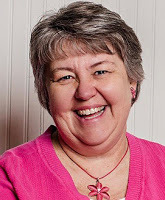 You’ll find Tammy using humor and wit to bring joy and hope to every aspect in life. She’s gone from down and defeated from a past filled with bullying and criticism from family to living a Tickled Pink life as she believes there is always a giggle wanting to come out! All because of HIM.
You’ll find Tammy using humor and wit to bring joy and hope to every aspect in life. She’s gone from down and defeated from a past filled with bullying and criticism from family to living a Tickled Pink life as she believes there is always a giggle wanting to come out! All because of HIM.She’s the Social Media Coordinator for the Blue Ridge Mountains Christian Writers Conference. President of ACFW Upstate SC, Past-President and current member of Word Weavers Upstate SC and Past-President of Cross N Pens Writers Group. She’s a member of My Book Therapy/Novel Academy. A writing team member for The Write Conversation, contributor for the Learn How to Write a Novel Blog and others. Published in the Divine Moments Compilation Book—Cool-inary Moments.
She’s married to her college sweetheart Larry, a mom to their grown daughter, Kristen and excited to add a son-in-law in 2021. Born and raised in Ohio, she now lives in South Carolina. Connect with Tammy at HTTPS://TAMMYKARASEK.COM.
Published on August 14, 2021 22:00
August 13, 2021
As Writers, Let’s not be Sore Losers

by Beth K. Vogt @BethVogt
The 2020 Tokyo Summer Olympics ended eight days ago. I tuned in for the opening ceremony, as well as gymnastics, sculling, fencing, archery, swimming—a plethora of events. I loved the athletes’ stories most of all.
There is one story I’m still mulling over—and no, it’s not gymnast Simone Biles’ decision to withdraw from competition and how she highlighted athletes’ mental health.
Ben Whittaker, a British boxer, was so upset about winning a silver medal at the Tokyo Olympics, he refused to wear his medal and cried on the podium. He collected his medal and stuffed it in his pocket, taking it out briefly for photos, but still refused to wear it.
When the BBC asked him why he was upset, he said, “You don’t win silver. You lose gold. I’m very disappointed. I feel like a failure.”
Winning a silver medal at the Olympics is failing? For this man, yes, yes, it is.
Perspective is everything, my friends.
I can’t engage Whittaker in a conversation, so let’s talk about us today. How do we receive those less-than-we’d-hoped-for moments in our writing lives?
I’ll go first.
There have been a few occasions when I was focused on that first-place finish above all else. When I didn’t achieve it, I wasn’t immediately thankful being “just” a finalist in a contest. Or for coming in second. Or third.
You know what that’s called?
Being a sore loser.
Ouch.
That attitude? It’s also being ungrateful for what I did receive—being blind to what I was given. Nothing is guaranteed in this publishing journey. Nothing. The numbers of readers who follow us. Our first—or next—contract. Awards. Sales.
None of it.
The only thing we can guarantee is how we respond to the lows and highs we encounter along the way.
We choose whether we view ourselves as losers—like the Olympian who won a silver medal did—or whether we see ourselves as winners. Whether we celebrate our victories—large, small, and miniscule.
Feeling like a failure? That doesn’t mean you are one.
If I could have talked to Whittaker, I would have told him to stop crying. To lift his head. To pull the silver medal out of his pocket and wear it because he earned silver—he didn’t lose gold.
What would you have told him?
TWEETABLEAs Writers, Let’s not be Sore Losers - @BethVogt on @EdieMelson (Click to Tweet)
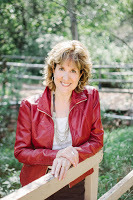 Beth K. Vogt believes God’s best often waits behind the doors marked “Never.” Having authored nine contemporary romance novels and novellas, The Best We’ve Been, the final book in Beth’s Thatcher Sisters Series with Tyndale House Publishers, releasers May 2020. Other books in the women’s fiction series include Things I Never Told You, which won the 2019 AWSA Award for Contemporary Novel of the Year, and Moments We Forget. Beth is a 2016 Christy Award winner, a 2016 ACFW Carol Award winner, and a 2015 RITA® finalist. An established magazine writer and former editor of the leadership magazine for MOPS International, Beth blogs for Learn How to Write a Novel and The Write Conversation and also enjoys speaking to writers group and mentoring other writers. Visit Beth at bethvogt.com.
Beth K. Vogt believes God’s best often waits behind the doors marked “Never.” Having authored nine contemporary romance novels and novellas, The Best We’ve Been, the final book in Beth’s Thatcher Sisters Series with Tyndale House Publishers, releasers May 2020. Other books in the women’s fiction series include Things I Never Told You, which won the 2019 AWSA Award for Contemporary Novel of the Year, and Moments We Forget. Beth is a 2016 Christy Award winner, a 2016 ACFW Carol Award winner, and a 2015 RITA® finalist. An established magazine writer and former editor of the leadership magazine for MOPS International, Beth blogs for Learn How to Write a Novel and The Write Conversation and also enjoys speaking to writers group and mentoring other writers. Visit Beth at bethvogt.com.
Published on August 13, 2021 22:00
August 12, 2021
The Ministry of a Book Launch

by Joshua J. Masters @JoshuaJMasters
I welcomed the typical author concoction of excitement and uncertainty in the depths of my spirit as I hovered over the send button. With a click of the mouse, the first email went out announcing an invitation to join the launch team for my new book, A Faith Unleashed: Living in the Hope of God’s Rescue.
The message described the true story of a rescue dog’s journey from isolated brokenness to joyful belonging and how it mirrors our own spiritual path, teaching us to a pursue a healing relationship with the One who brings true rescue. Throw in a cute dog on the cover and who wouldn’t stumble over themselves to be part of that launch team?
Well, it turns out many people.
Some people I thought certain would join even unsubscribed from my mailing list. My publisher assured me the sign-up response for the first week was outstanding, but I expected more. I had others sign up but never follow-through on joining the group.
In the end, we had an incredible team, and the launch was very successful. I wouldn’t change a thing now, but I fought discouragement in the early stages of building the team. What if no one else signs up? What if the people who sign up don’t share any of the posts? What if they don’t leave a review? What if… what if… what if?I’m sure others have had similar experiences and the harsh realization everyone isn’t as excited about your launch as you think they should be is jarring.
But I’m not sharing this to complain about my experience or discourage you in yours—I’m sharing it because it was the catalyst God used to correct my less than stellar attitude.
The “What if” question God wanted me to ask was this:
What if I stop focusing on what a launch team can do for me and start focusing on how the launch team is a ministry opportunity for me to encourage them?
After all, when we look past the pride and love God’s given us for the project He put on our hearts, why would a large group of people drop everything to promote our book?It’s not the prizes.It’s not the early reader-copy of our book.It’s not the secret Facebook group.Those are perks, but they’re not valuable enough on their own to build a successful launch team.
The true value we can offer our team isn’t swag but community.
Many of us want a launch team that will do tasks but that’s not community, it’s labor. And it’s difficult to build a labor force with free bookmarks.
The tasks are important but launch teams can plunge into the same false works-mentality trap many churches do. Rather than convincing people to do tasks, what if the actions came out of sincere gratitude for what God is doing in the group rather than obligation?
I was fortunate enough to have a launch coordinator to organize the tasks and prize drawings in my launch. So, I resisted the temptation to watch who was completing this task or that challenge and focused on building community and ministry within the group.
I didn’t do that perfectly, but I saw a powerful community of transparency and support emerge from the group that far outweighed the immense benefits my book still received.
We want to honor God in our writing, and the launch team is our first tangible opportunity to serve others through the book He’s given us.
FIVE TIPS TO BUILD A COMMUNITY OF MINISTRY IN YOUR LAUNCH TEAM
1. Be truly transparent.Launch teams love getting to the know the behind-the-scenes information about your book. But set a tone of transparency right from the beginning, modeling the safety in your group to share real things. Go beyond your process and share your brokenness. Share how God has transformed you through your writing rather than how you write. People are already there to support you, so you don’t need to impress them. Your testimony is more powerful than your process.
2. Promote personal sharing.Make sure your posts encourage people to share their own story rather than their love for yours.
I chose to do a weekly chapter reading for my launch team via Zoom. This gave us the opportunity to talk with one another in a live setting. But be cautious when you facilitate those conversations. Avoid questions like, “What did you like about the chapter?” or “What was your favorite part?” Those questions put the focus on the book rather than the people.
Instead, try asking, “Even if it’s not related to what was in the chapter, what did you sense God saying to you as we were reading?” or “How does your story connect to what we read?” The most powerful moments in my group didn’t come from a quote in the book, but from someone sharing about a lost spouse or a broken relationship and watching the other group members minister to that person.
3. Encourage sincere prayer.In many Christian activities, we relegate prayer to a list of requests hurriedly written at the end of a meeting. Make prayer a cornerstone of your launch team—not for the launch but for the people. With transparent, personal sharing there are abundant opportunities to pray for one another’s felt needs.
Encourage members to comment on one another’s posts and build one another up. Don’t just say, “We’ll pray for you,” openly model it in the group arena and follow-up with people who have requested prayer.
4. Continually point to Christ.The obvious temptation of a book launch is to focus on the author or the book, but Christian authors write to glorify Christ. So, He should be at the center of our book launch—not in a token way, but in a continual state of praise and worship.
Your book will not change someone’s life. It won’t. But the Holy Spirit may use it to transform someone’s life. See the difference? The wording may be subtle, but until we internalize that truth in our spirit, we’ll continue to seek success over our calling. Make sure the sharing, group posts, and group prayer all point to what God is doing in the group. It’s Christ that binds us together in community, not our writing.
5. Ask God these questions as you plan your launch:What should I do to selflessly serve those who are on my launch team?What should I do to build a healthy community among the participants?What should I do to encourage engagement with one another rather than just the book?What do You want to teach me through the launch team?As counter-intuitive as it may seem, the less we make our book launch about the success of the book, the more powerful the experience will be for you and your team. That doesn’t mean we ignore the book or pretend we’re not there to do a job—but it does mean using the book as a stage for ministry rather than using people as a stage for my book.
If you sincerely care more about the members of your team than the triumph of your book, God will take care of the rest.
TWEETABLEThe Ministry of a Book Launch - @JoshuaJMasters on @EdieMelson (Click to Tweet)
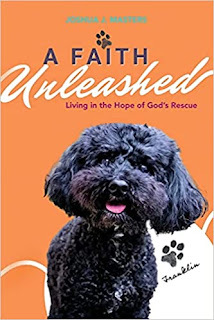 A Faith Unleashed
Living in the Hope of God's Rescue
by Joshua J. Masters
A Faith Unleashed
Living in the Hope of God's Rescue
by Joshua J. MastersLife tries to convince us we're alone and unwanted, tied to our past and without hope for the future.
Daily trials challenge our faith as our souls beg for renewal, but rescue is coming.Abused and neglected, Franklin spent his first Christmas huddled in a lonely puppy mill. In this true story, his path from isolated brokenness to joyful belonging mirrors our own journey toward the promise of Christ. Each chapter of Franklin's story serves as the backdrop for a biblical approach to exploring questions of faith, encouraging individual growth, and deepening our relationship with God. Franklin's humorous and heartwarming tale will lead you to the ultimate source of life.
UNLEASHING YOUR SOUL TO EXPERIENCE GOD'S LOVE.
 Joshua J. Masters is a pastor, author, and speaker with a heart for encouraging others. His book on prayer,
AMERICAN PSALMS
, was a Serious Writer’s Book of the Decade finalist. He’s been featured on CBN Television, HIS Radio, the Light Radio Network, and worked in the film industry as a member of SAG-AFTRA performer. He is a regular teacher and speaker for large groups. A self-proclaimed sci-fi and comic book geek, Josh loves film, pop culture and is known in some circles as
THE BAT PASTOR
. Joshua was raised in the White Mountains of New England and now serves as a pastor in South Carolina where he lives with his wife, Gina, and their miniature poodle,
FRANKLIN THE PUP
, who is the subject of his latest book. Josh would love to connect with you on his website,
JOSHUAJMASTERS.COM
Joshua J. Masters is a pastor, author, and speaker with a heart for encouraging others. His book on prayer,
AMERICAN PSALMS
, was a Serious Writer’s Book of the Decade finalist. He’s been featured on CBN Television, HIS Radio, the Light Radio Network, and worked in the film industry as a member of SAG-AFTRA performer. He is a regular teacher and speaker for large groups. A self-proclaimed sci-fi and comic book geek, Josh loves film, pop culture and is known in some circles as
THE BAT PASTOR
. Joshua was raised in the White Mountains of New England and now serves as a pastor in South Carolina where he lives with his wife, Gina, and their miniature poodle,
FRANKLIN THE PUP
, who is the subject of his latest book. Josh would love to connect with you on his website,
JOSHUAJMASTERS.COM
Published on August 12, 2021 22:00
August 10, 2021
ABC’s of Newspaper Writing, part two
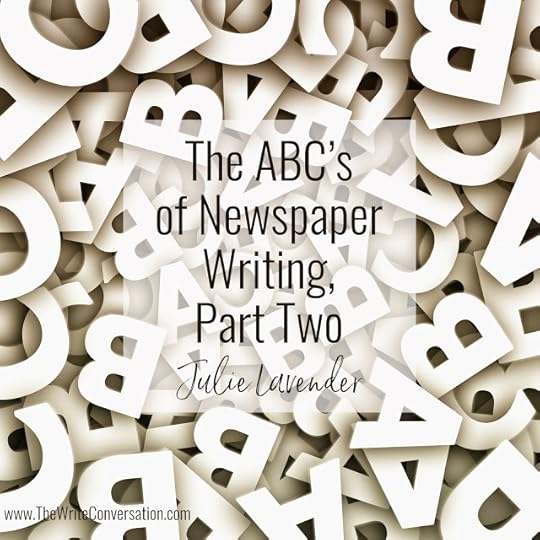
by Julie Lavender @JLavenderWrites
In a recent column, I shared an alphabet-list of newspaper writing jargon in hopes of enticing you to consider newspaper writing as a viable way of adding valuable credits to your writing portfolio. (You’ll find that article here https://thewriteconversation.blogspot.com/2021/06/the-abcs-of-newspaper-writing-part-one.html#more.)
Newspaper contributions offer many benefits to a writer, like gaining those much-needed clips to share with an editor, publisher, or agent as proof of published works; practicing the concept of writing tight; meeting editor’s deadlines; crafting a ‘story,’ whether fiction or non-fiction, and much more.
As I’m sure you know, most newspapers across the country, in general, don’t make a practice of “talking about God” regularly, but many are not as opposed as others. My newspaper here in south-Georgia falls into that category, and religious organizations’ events are often reported in our paper.
When my newspaper editor first gave me the freelance stringer job of writing “faith-based articles,” he gave me vague and few guidelines but did insinuate that he didn’t want me “to preach” nor “include many Bible verses.”
BUT – my editor never said I couldn’t include quotes from my subjects doing just that!
Many of the assignments he gave me, on the surface, had no faith focal point and wouldn’t lend itself to those kinds of messages … without some digging on my part!
Some of the stories, with just a bit of my own reporter-led questions during the interview netted a “God-comment” that I included in the paper. You see, I did my research first, if I didn’t know anything about the organization or event or person I was interviewing, and if I found out there was any hint of a faith-walk related to the story, then I planned my interview questions accordingly.
Often, I knew the subject of the article personally and knew of their walk with the Lord. That familiarity allowed me to easily bring the interview around to faith components.
To continue with my ABC’s of newspaper writing, I’m going to share some articles I’ve had the pleasure to write in hopes that you’ll be stirred to look for and share similar, related stories in your local paper. I’ll share a few headlines and summaries in this column, and others in subsequent articles.
ABC's of Newspaper Writing
*A special mother-daughter day: Cancer patient pampered at Serenity Day Spa and Lori Grice Photography
My editor assigned this story at the request of the health organization responsible for the event. Obviously, they hoped to get “free publicity” for their non-profit organization, but they also knew it was a “feel-good” kind of story that would be of interest to readers. I wasn’t familiar with the organization because it wasn’t located directly in my hometown, but I knew the photographer who was volunteering her services, and I knew her faith story.
I spent a couple of hours at the day spa where the event took place for the wheelchair-bound patient and her mother.
My story began this way: “When asked what she wanted to make her dreams come true, Adrian Perkins, a cancer patient at PruittHealth-Bethany in Millen said she wanted to feel pretty.
Perkins, 29, wanted a makeover and photo session. ‘And pizza and shopping,’ she added.
The special day is part of a Committed to Caring project that PruittHealth-Bethany carries out through a partnership with a company called Second Wind Dreams that supplies the resources to make a person’s dreams come true.”
Sometimes, my interview subjects only alluded to such topics as “church” or “Christian music” to show any indication of their faith. But, I make sure to include those nuggets in my story.
Later in the article, I added these details from the interview: “Raised by her grandmother in Millen, Perkins grew up attending church and said that she learned to love gospel music as a child and now it plays a huge role in her comfort and faith during her sickness.”
I also included a quote from the photographer that I knew personally: “Lori and her husband DeWayne aren’t new to this type of session and said they started several years ago giving the gift of family portraits to cancer patients and others in need.”
“Cancer survivor Lori said, ‘It’s our ‘thank you’ to God.’”
The quotes I included weren’t pertinent to the news event that I was asked to write about, but made the story more powerful, in my opinion, and gave me the opportunity to share God-moments in the article.
*Blessing of the Crops: Farmers, others gather to pray for growing season
As is obvious from the newspaper article title, this story has a specific faith component. The early-morning gathering is an annual event sponsored by the Statesboro-Bulloch County’s Chamber of Commerce’s Agribusiness Committee where attendees gather to pray for the upcoming growing season. In my rural, agricultural community, this is relatable news for many of my newspaper readers, but would be “new news” for many of the university professor residents who hail from all over the country or industry workers not-native to our community.
This article lent itself to great “God-quotes.”
I included this one: “Farmer Ryne Brannen summarized the thoughts of many when he said, ‘Everything we do, we’re utterly dependent on God. He provides everything we need. Without him, it doesn’t matter what we do.’”
*Chocolate Run benefits Open Hearts Community Mission: A ‘sweet’ way to assist Boro homeless shelter.
Still relatively new to our community, the homeless shelter happenings are big events for us. I know the director and founder personally, a strong believer who never hesitates to give God credit and honor. Though my editor wanted readers to know about the fund-raising event, I knew I’d get great “God-quotes” for the story.
The article begins, “Here’s your annual chance to eat lots of chocolate for a great cause and get some exercise, all at the same time.
The 7th annual Chocolate Run to benefit Open Hearts Community Mission is set for Saturday. Registration for the run is ongoing and will remain open through 8 a.m. on Saturday.”
Details later in the article include this info: Open Hearts Community Mission is a faith-based ministry dedicated to serving the homeless. The Open Hearts mission states, ‘To feed the hungry, shelter the homeless, restore the downtrodden and share the Gospel of Jesus Christ.’”
As you can see, I enjoy using assignments from my newspaper editor as a ministry to mention “God” as often as possible. And, while wearing my interview-hat, I make every attempt to steer my questions to elicit faith stories and quotes.
What about you? Do you know someone in your community who has a great, news-worthy, human interest story that lends itself well to a faith component and God-quotes? Why not offer that story to your local paper’s editor and see if you can earn a new writing credit for your resume!
TWEETABLEABC’s of Newspaper writing, part two - @JLavenderWrites on @EdieMelson (Click to Tweet)
 Julie Lavender, author of 365 Ways to Love Your Child: Turning Little Moments into Lasting Memories (Revell), loves sharing God-stories in her paper and has written over 1000 newspaper articles thus far. Connect with Julie on social media – she’d love to help you earn writing credits by submitting to your local paper!
Julie Lavender, author of 365 Ways to Love Your Child: Turning Little Moments into Lasting Memories (Revell), loves sharing God-stories in her paper and has written over 1000 newspaper articles thus far. Connect with Julie on social media – she’d love to help you earn writing credits by submitting to your local paper!
Published on August 10, 2021 22:00
Publishing as a Second Language: Front Matter and Back Matter—Does It Really Matter?

by Linda Gilden @LindaGilden
Once you finish the body of your manuscript, it’s time to add the extras. Most books will include endorsements, acknowledgements, dedication, table of contents, bio of the author or authors, previous books by the same author or authors, a Q & A with the author, a chapter of the next book. Some people include a preface, prologue, or forward. It is not necessary to have all of these, but they are all possibilities.
What to IncludeEndorsements are often at the very front of the book. Make sure to include some people who are some way connected to the subject of your book. The purpose of your endorsements is to entice others to buy and read your book.
Your preface, prologue, and foreword usually go right before your manuscript begins.
Acknowledgements thank those who have been especially helpful in the process of developing your book.
Dedications are saved for those who you want to give special recognition. This may be a family member or a special friend.
Table of Contents provides a listing of the chapters in the book.
Bio of the author gives the reader more information about the author and hopefully provides new connecting points. Provide pertinent information but also include a fun fact or two that will bring the reader into your world and be memorable. This is different from the short bio that you find on the back cover of the book.
A page with your previous books lets your readers know what you have written before.
A question-and-answer section is another way for your readers get to know more about you. Answer questions they might have that will support the message of your book.
If you are writing a fiction series, you may want to include a prologue or first chapter of your next book. This will help readers look forward to the next book.
Many books arrange their front and back matter a little differently and not all books include every item mentioned. In my last book, endorsements were first followed by the dedication and table of contents. The back matter began with the acknowledgements, a resource page, our bios. (This was a coauthored book with Linda Goldfarb, LINKED for Couples.) A page of other LINKED books in the series. We included an appendix for the Q & A and the assessment key to our personality assessment. If you have discussion questions, they will work best here.
This arrangement is a little different from some I have used. Sometimes the author has a preference as to where things go. Sometimes the publisher has a certain format they like to follow. Include items that will make your writing memorable and more valuable to your readers.
Does this really matter? Yes! You are sharing more of yourself with your readers and making new friends and fans as you go.
TWEETABLEPublishing as a Second Language: Front Matter and Back Matter—Does It Really Matter? @LindaGilden on @EdieMelson (Click to Tweet)
 Linda Gilden is an award-winning writer, speaker, editor, certified writing and speaking coach, and personality consultant. Her passion is helping others discover the joy of communicating with excellence. In the midst of all the busyness, Linda’s favorite activity is floating in a pool with a good book surrounded by splashing grandchildren—a great source of writing material! www.lindagilden.com
Linda Gilden is an award-winning writer, speaker, editor, certified writing and speaking coach, and personality consultant. Her passion is helping others discover the joy of communicating with excellence. In the midst of all the busyness, Linda’s favorite activity is floating in a pool with a good book surrounded by splashing grandchildren—a great source of writing material! www.lindagilden.com
Published on August 10, 2021 22:00
August 9, 2021
Tips to Set Your Own Publishing Pace

by Cindy K. Sproles @CindyDevoted
Once the manuscript is complete. It’s been shopped. Sold and awaits publication. You can lean back and take a breath. Or can you? What’s next? In this post, we’re going to discuss some hard things for you to hear, but I want you to learn the truth and not live on assumptions.
Writing is a difficult business. Like acting and singing, sometimes it’s just being in the right place at the right time (hence, why conferences and networking are so important.) New writers tend to fall into the “romance of writing” without seeing the “work of writing.”
This leads to discouragement or, even quitting. It is with great love and a burning desire for you to succeed, that we launch headlong into some heart-to-heart information.
Set Your Own Publishing Pace1. Writing is not a fast process: In my early years, there was no self-publishing. Writers had to pound out hard work and jump through hoops to become published authors. I miss this for many new writers. I’ve said a hundred times, bloody knees are worth the bandaids. For every disappointment or fall you take, you are learning a) the craft of writing, b) how to manage rejection, and c) you grow to teach others following behind you with great experience.
In the years of doing acquisitions for publishers, I was always saddened that new writers would lay great stories in front of me, but the work was not up to publication standards yet. It could be, with just a tad more work, but at that moment, it wasn’t. When these writers were rejected, they just self-published (which is fine, if you go back and bring the work up to the level it needs to be for publication—many times, that doesn’t happen.)
The work gets self-published. Sales are about 150 books, and they fizzle out. Think about the work it took to write that book, rush it to publication, only to have it buried in the millions of books on Amazon. I once heard Mary Kay Ashe (founder of Mary Kay Cosmetics) say in a speech, “Much greatness is lost if not for just a few more hours of hard work.” I wrote that down in my life book because it doesn’t matter what your effort is put into, the lack of just short of a few more hours of hard work, applies to anything we do in life. If you self-publish, do it right and with reputable publishers who do the work well.
Understand, for you to grow as a writer, it’s going to take time and nothing in this business is fast except deadlines.
2. Small Houses vs Large Houses: Many new authors get their start with small publishers. There are several reasons. 1) Many times, small houses do not require you to have an agent, 2) they are great places to get your feet wet in the industry, and 3) there may be a few more open spaces to publish great stories. Larger houses require a larger platform, sales performance, an agent, and a superb story. Small publishers generally do not have financing to offer an advance where large publishers can pay an advance on your sales.
The truth, though unfair as it is to those authors who really do work hard to sell their books, is that publishing is a numbers game. When you are an author in a small house, the dollars are usually not there for much marketing or a deeper arm into industrial distribution, i.e. that hands-on person selling the book to the retailers. This means that you can still have a great book published that will receive some exposure, but usually not enough to bring in the sales numbers agents and larger houses are looking for in a sales history.
Unfortunately, larger houses and larger literary agencies may pass because the sales or platform is not large enough to help recuperate the cost of publishing the book. As much as even publishers wish it wasn’t this way, publishing is still a business, and to be able to pay an advance or larger royalty percentages to authors and agents, publishers have to be able to first, pay the costs involved in publishing the book. Publishers want to be able to maintain the ability to pay those advances – it’s a perk and an incentive. Secondly, they need to continue to invest in future books that will bring that return again so the circle can continue.
There are pros and cons to working with both sized publishers, but it is important to know that publishers aren’t money-hunger mongers either. Deciding on five books to publish out of the hundreds reviewed is harder on the publisher. Authors just have to wait. Publishers must absorb the cost of running a company and turning enough profit to keep up the work. They are equally as disappointed to say no to a good manuscript than an author is to receive the rejection. Before you take aim at a publisher for rejecting your manuscript, understand the agonizing process they must go through to whittle down submissions, then offering only a few contracts when they want to offer many.
On the other hand, be an author who works overtime to help market and sell your book. The more you do, the more your sales climb and the greater that needle raises on the scale toward receiving a contract with a larger house.
3. Author Career goals: Here’s where your feelings may get pressed, so know that these words are meant with the greatest intention. Don’t be satisfied with the first phase of your writing career. Don’t plan on living in the footprint of a smaller house or never having an agent forever. Small houses are wonderful—don’t misunderstand, but always set the bar to the next level for your career growth. Earlier we stated that smaller houses don’t always require a writer to have an agent, but don’t set that phase of your career as your standard. Reach for the next level.
I’ve heard authors say, “I’ve tried to get an agent but none are interested.” My rebuttal to that is simple. It should tell you something about your command of the craft, even if you have published books. If you have several books published through a smaller house, and you’ve had a great experience, then challenge yourself to grow to the next level. Work on your skills so that an agent looks at your work and raises a brow.
The better you know the craft, the more it shows in your writing—and the more it is noticed for new and bigger opportunities. Never just settle for publication. Strive for excellence. When you author for a small house, bust your chops to do a superior job for them, for they’re breaking you into the industry. Show your appreciation by working hard to write, sell, and market and when greater opportunities come along, they will rejoice with you knowing they had a hand in getting you a start.
Goals are important. Set a pace for yourself, add those goals. Attain them. And your career will blossom.
TWEETABLETips to Set Your Own Publishing Pace - @CindyDevoted on @EdieMelson (Click to Tweet)
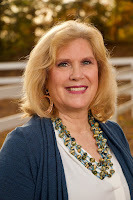 Cindy K. Sproles is an author, speaker, and conference teacher. She is the cofounder of Christian Devotions Ministries and the executive editor for christiandevotions.us and inspireafire.com. Cindy is the lead managing editor for SonRise Devotionals and also Straight Street Books, both imprints of LPC/Iron Stream Media Publications. She is a mentor with Write Right and the director of the Asheville Christian Writers Conference held each February at the Billy Graham Training Center, the Cove, Asheville, NC. Cindy is a best selling, award winning novelist. Visit Cindy at www.cindysproles.com.
Cindy K. Sproles is an author, speaker, and conference teacher. She is the cofounder of Christian Devotions Ministries and the executive editor for christiandevotions.us and inspireafire.com. Cindy is the lead managing editor for SonRise Devotionals and also Straight Street Books, both imprints of LPC/Iron Stream Media Publications. She is a mentor with Write Right and the director of the Asheville Christian Writers Conference held each February at the Billy Graham Training Center, the Cove, Asheville, NC. Cindy is a best selling, award winning novelist. Visit Cindy at www.cindysproles.com.
Published on August 09, 2021 22:00
August 8, 2021
Speaking Tips for Writers: Meet Patricia A. Durgin

by Yvonne Ortega @YvonneOrtega1
If you’re a writer, you'll want to meet Patricia A. Durgin. She delivers speaking tips for communicators with personality, power, and purpose.
 Introduction of Patricia A. DurginBelow her name on a PowerPoint slide, you’ll read, “Christian Communicators Becoming Change Catalysts.” Her introduction on the slide lists the following bullets:Your First PublicistBrand and Platform BuilderAWSA Certified Christian Writer and Speaker CoachHost: Today’s Breakthrough Podcast (Spring 2022)Kingdom Marketers (free monthly marketing training)Her Emphasis on AuthenticityPatricia Durgin tells her audience—speakers, writers, coaches, mentors—to serve the needs of their specific audience, not someone else's. She adds that they should be themselves and not imitate another person's style. She bubbles over with the fruit of the Spirit: “love, joy, peace, forbearance, kindness, goodness, faithfulness, gentleness, and self-control” (Gal. 5:22–23 NIV). That reflects her outgoing personality.
Introduction of Patricia A. DurginBelow her name on a PowerPoint slide, you’ll read, “Christian Communicators Becoming Change Catalysts.” Her introduction on the slide lists the following bullets:Your First PublicistBrand and Platform BuilderAWSA Certified Christian Writer and Speaker CoachHost: Today’s Breakthrough Podcast (Spring 2022)Kingdom Marketers (free monthly marketing training)Her Emphasis on AuthenticityPatricia Durgin tells her audience—speakers, writers, coaches, mentors—to serve the needs of their specific audience, not someone else's. She adds that they should be themselves and not imitate another person's style. She bubbles over with the fruit of the Spirit: “love, joy, peace, forbearance, kindness, goodness, faithfulness, gentleness, and self-control” (Gal. 5:22–23 NIV). That reflects her outgoing personality. Her personality reminds me of a bubbling chocolate fountain with a variety of fruit at its base. She smiles and laughs often. She sometimes loses her place and shouts, “Help me, Jesus.” When she finds her place again, she says, “Thank you, Jesus.” She sprinkles her conversational format with “Hallelujah, amen, and thank you, Father.” And she delivers a powerful message.
Introverted speakers and writers can also present an effective message and reach millions. We see examples of that daily through our own Edie Melson and some of the monthly contributors to The Write Conversation.
The God-given MessageImagine a red name tag with white letters that spell “Vision Impaired.” That’s what Patricia wears. That impairment has not prevented her fulfillment of God’s call on her life to help speakers and writers. Likewise, she emphasizes that we are to serve our audience before a book is on our mind, before a book proposal, before a book launch. You and I can procrastinate with several excuses.
As you read this, your mind may race through the “what-ifs.”What if I don’t have enough time?What if I don’t have the money?What if I don’t have the equipment?Her answer is faith. “He’s called you, and he will give you what you need.” She also instructs us to use what we have and trust God one step at a time for the rest. She admits that circumstances in our lives can limit or stop our work for a season. Illness, loss of a loved one, and caregiving are examples.
Marketers on a Mission Patricia emphasizes that we are to help our audience see themselves beyond their situation. We share our testimony, and let God work in their lives.
With the audience as our priority, we trust God to create it and to build our platform.
Her Facebook group, Marketers on a Mission, has 1.5K followers. The letter t in Marketers is a cross. If you need encouragement and support as a speaker and author, go to Marketers on a Mission on Facebook. Read the memes. For starters, I’ll share the headings of three of them.“Good morning! Your audience works hard to find you? Will you reach them where they are?”“Can’t see the path? Hold onto Jesus. He knows the way!”“God will remember the promises He made to you in the dark, even if it’s years later. Your dreams are safe in His care. Hallelujah! Thank you, Father!”You can find Patricia A. Durgin on her Facebook page, Marketers on a Mission, at Christian writers conferences, in the archives of the AWSA (Advanced Writers & Speakers Association) Inner Circle, and on her website at marketersonamission.com
If you attend the AWSA (Advanced Christian Writers Association) Annual Retreat, you can participate in her session on “How to Create Landing Pages That Convert.” You can learn more about the retreat at https://awsa.com/?p=6481)
TWEETABLESpeaking Tips for Writers: Meet Patricia A. Durgin - with @YvonneOrtega1 on @EdieMelson (Click to Tweet
 Yvonne Ortega walks with a small footprint but leaves a giant imprint in people’s lives. This power-packed package is a professional speaker and the author of the Moving from Broken to Beautiful® Series through cancer, divorce, forgiveness, and loss. Learn more at WWW.YVONNEORTEGA.COM
Yvonne Ortega walks with a small footprint but leaves a giant imprint in people’s lives. This power-packed package is a professional speaker and the author of the Moving from Broken to Beautiful® Series through cancer, divorce, forgiveness, and loss. Learn more at WWW.YVONNEORTEGA.COMYvonne speaks with honesty and humor as she shares her life and struggles through presentations that empower women to find peace, power, and purpose through God’s Word.
Yvonne’s background as a licensed professional counselor brings a unique perspective into the heart of women. She’s a speaking and writing coach and the owner of Moving from Broken to Beautiful®, LLC. She belongs to the Advanced Writers and Speakers Association, the Christian Authors Network, the National Speakers Association, and Toastmasters International.
She celebrates life at the beach, where she walks, builds sand castles, blows bubbles, and dances.
Published on August 08, 2021 22:00
August 7, 2021
Searching for Guilt

by Martin Wiles @LinesFromGod
“In those days, at that time,” declares the Lord, “search will be made for Israel’s guilt, but there will be none, and for the sins of Judah, but none will be found.” Jeremiah 50:20 NIV
I once searched for snakes…poisonous ones.
Why searching for snakes as a teenager intrigued me, I’m not sure. Perhaps I wanted to brag to my peers about my dangerous missions. Acceptance, you know. That thing we all look for from the earliest of ages. I certainly didn’t want to find a poisonous snake. I was actually a little scared of snakes. At least, if they saw me before I saw them.
So, a friend—who was as crazy as I was—and I donned our loose-fitting clothes and boots, shouldered our guns, and set off for swamps and other areas where we likely would encounter those slithering serpents. Fortunately, we never found any, although I have found a number of them when I wasn’t looking. My searches proved fruitless.
I also remember the time when, as a young lad, I bounced three rubber bouncy balls in my grandmother’s house. The kind once sold from gumball machines that normally perched near the exit of grocery and retail stores. The kind that would catch a young fella’s eye, making him tug at a grandparent’s trouser leg or shirt sleeve and beg for a penny or a nickel which he would then insert into a slot, turn the knob, and relish over what came out. And I bounced all those balls simultaneously and watched them scatter in different directions. I searched my grandparents’ home for days but never found them.
And then there was my next-to-the-oldest grandson’s fedora. He loved wearing one like his Pop. But somehow, he misplaced it. We searched our house; our daughter searched hers. Nothing. Not until I took the bed apart one day to erect a new bed frame did I find it nestled under the bed. I placed it on one of the headboard poles, knowing he would get it the next time he came. By this time, he had moved eleven hours away to another state. Sure enough, when he visited, he went immediately to the room and snatched up his hat. His search was successful.
Jeremiah wrote to God’s people who at the time lived in Babylonian captivity—far away from their native land. He told them of a day when they would return to their promised land. And when they did, they wouldn’t disobey God anymore. They would have learned their lesson. A search would be made for their guilt, but it would not be discovered.
One thing I’ve found numerous times is guilt. The thing I feel when I’ve done, said, or thought something I shouldn’t have. Something God has forbidden. But although I’ve found it, I don’t live with it. Feeling guilty over an action or a wrongly spoken word and living with guilt constitute two different things.
Jeremiah’s good news for Israel is good news for everyone. God has provided the means by which our state of guilt can be removed. Jesus paid for our sins on Calvary’s cross—past, present, and future. When we accept His payment and ask for His forgiveness, we no longer must live in a state of guilt. He removes our condemnation and clothes us in His righteousness.
Others may reject us, but we no longer have to search for acceptance. God receives us into His family and calls us His children and friends.
Don’t search for or live with guilt any longer. In Christ, you are accepted and loved.
TWEETABLESearching for Guilt - Martin Wiles, @LinesFromGod, on @EdieMelson (Click to Tweet)
 Martin Wiles is the founder of Love Lines from God (www.lovelinesfromgod.com) and serves as Managing Editor for Christian Devotions, Senior Editor for Inspire a Fire, and Proof Editor for Courier Publishing. He has authored six books and has been published in numerous publications. His most recent book, A Whisper in the Woods: Quiet Escapes in a Busy World, released in December 2019. He is a freelance editor, English teacher, author, and pastor.
Martin Wiles is the founder of Love Lines from God (www.lovelinesfromgod.com) and serves as Managing Editor for Christian Devotions, Senior Editor for Inspire a Fire, and Proof Editor for Courier Publishing. He has authored six books and has been published in numerous publications. His most recent book, A Whisper in the Woods: Quiet Escapes in a Busy World, released in December 2019. He is a freelance editor, English teacher, author, and pastor.
Published on August 07, 2021 22:00
August 6, 2021
How Do I Pick the Right Writing Advice?

by Tim Suddeth @TimSuddeth
Where do you go when you want writing advice? No, your mama won’t work.
Whether it’s for advice on the craft of writing, the business side of getting published, or just finding out where to begin, do you know who to listen to?
Finding advice for writers isn’t like searching the desert for a drop of water or checking my couch for a ten-dollar gold piece. It’s more like seeking water and having the Hoover Dam explode next you. It seems to be everywhere you turn.
With dozens of Facebook groups, hundreds of blogs, and thousands of books all to give advice to writers, our problem isn’t an inability to find answers to our questions, it’s knowing which of the eight answers we find we should listen to. Even on this blog, you are going to read posts from different writers and, although they will give opposing advice, all of them may be correct.
Case in point, do you end a sentence with a preposition? Yes, no, it depends (usually my favorite answer), never, maybe. It’s enough to make you want to hit delete or throw your device across the coffee shop.
In this article, I’m not really going to look at where to go to look for answers. But I want us to look at how to decide which answers will work for you.
How to Find the Writing Advice That’s Right for You1. Advice is never universal.We need to recognize that when we are looking for answers, one size doesn’t fit all. Just like looking for clothes at the store, you probably need to try it on first.
One of the great things about the writing field is that we have so many options of what we can do. Poetry, devotions, articles, plays, podcasts, screenplays, video games, memoirs, fiction (and all its many genres), blogs, mini blogs, reverse blogs, sagas, multi-volume series, flash fiction, haikus. I think you get the idea.
Advice that may work for a novel probably won’t work in a piece of flash fiction.
And who is your audience: women fiction, YA, middle schoolers? Are you writing for Mature Living, Focus on the Family’s Clubhouse, or Scholastic?2. Tastes change over time.Another part of this is that tastes change. Charles Dickens could go on for pages about the setting of a scene, but now we are told that readers have shorter attention spans and won’t tolerate such writing in their books.
Glad no one told that to J. K. Rowling.
When I was younger, Bible studies and articles were about how Christians shouldn’t cuss, shouldn’t smoke, boy cut your hair and girl take off that makeup. What most readers think is important has changed since then. If we are talking about the gospel, it hasn’t changed. But how to make it relevant in today’s world may have.3. Our likes and experiences are different.Everyone has different tastes, experiences, and strengths. And different God-giving gifts. He made us all unique. The path you watch someone else take, isn’t necessarily the one for you.
And isn’t it funny that we only look at the people who we think has it easier than us. We overlook the person who had ninety-five rejections. But the person who got published in our target magazine the first time the submitted, after we submitted to it for three years with no success, that’s the ‘friend’ we compare our journey to.
That the subject of their article was a tragedy their family experienced, we seem to miss.4. Does it help your reader understand?If there is one piece of advice that I think can help us decide what advice to follow, it is does it make our writing clearer, easier to understand. Unless you’re putting a red herring in a mystery, and you don’t want to make it too obvious for your reader. So, my point number one still holds.
We usually write because we want to make a point. It’s amazing how clear something can be in our mind, but when we try to get it down on paper or on a screen, it turns to gibberish. That’s where the craft comes in. That’s when we need to find the right advice to make our writing clear to our audience.
Our job is to put down the words and then weed out the words we don’t need. It’s so easy it’ll make you pull your hair out. And we are fortunate that there is so much out there to help us.
But choose wisely. Salt, sugar, and baking soda all look alike, but they each have their own very distinct purposes.
TWEETABLEHow Do I Pick the Right Writing Advice? - tips from @TimSuddeth on @EdieMelson (Click to Tweet)
 Tim Suddeth is a stay-at-home dad and butler for his wonderful, adult son with autism. He has written numerous blogs posts, short stories, and three novels waiting for publication. He is a frequent attendee at writers’ conferences, including the Blue Ridge Mountain Christian Writers Conference and a member of Word Weavers and ACFW. He lives near Greenville, SC where he shares a house with a bossy Shorky and three too-curious Persians. You can find him on Facebook, Twitter, or at timingreenville.com.
Tim Suddeth is a stay-at-home dad and butler for his wonderful, adult son with autism. He has written numerous blogs posts, short stories, and three novels waiting for publication. He is a frequent attendee at writers’ conferences, including the Blue Ridge Mountain Christian Writers Conference and a member of Word Weavers and ACFW. He lives near Greenville, SC where he shares a house with a bossy Shorky and three too-curious Persians. You can find him on Facebook, Twitter, or at timingreenville.com.
Published on August 06, 2021 22:00
August 5, 2021
Run Your Own Writing Race

by A.C. Williams @ACW_Author
Anybody else been watching the Olympics over the past few weeks? I sure have. I have marveled at the sheer physicality of these extraordinarily talented and dedicated athletes while I nosh on low-fat popcorn from the relative comfort of my couch and hum the Olympic theme on commercial breaks.
Aren’t the runners amazing? Those people are otherworldly in their grace and speed. They make running look effortless. Running is something I don’t do. Ever. The zombies can have me, and the rest of you can escape. I ain’t running.
But something stuck out to me, though, as I was watching the 400 meter dash the other evening. Every racer has his or her own lane, and their starting points are staggered along the curvature of the track. Why? Well, because geometry. (And that’s all I’m going to say because I hate geometry more than running.)
Because of the staggered starting points, it looks like the competitor on the outside track gets an advantage over the competitor on the inside track. They get to start further up. But the fact is, they are running the same distance.
Hello, Amy, this is a writing blog. Why are you talking about sports?
Well, haven’t you ever felt the urge to compete with another author? Haven’t you ever read a book and thought to yourself that you could write it better? Haven’t you ever looked at another author and asked why they got lucky enough to succeed at your dream when you haven’t?
I have.
Jealousy is something all of us will face at some point in our lives and in our careers. Even if you’re genuinely happy for your friends who have achieved great things, there’s still a tiny piece of your heart that wants what they have. How do you deal with that?
A friend and I were chatting about this over the weekend, and I realized that it’s still something I struggle with even now. The comparison trap is so easy to fall into, especially for creatives, but we shouldn’t compare ourselves to our fellow authors.
It’s a hard pill to swallow. I want success now. I have worked and struggled and sacrificed for my craft for years, and that means I should win. Doesn’t it? I should be a bestseller ten times over by now, right?
Why do I have to overcome all of these challenges no one else has? Why does my life have to be so much harder than everyone else’s? Why can’t I have the support that all my peers seem to have?
If you’ve asked yourself those questions, please know that you’re not alone. We all struggle with this on some level. We all fight that old green-eyed monster at some point. It doesn’t even have to be about writing. It can be about any aspect of life. And I can tell you what has helped me.
Run your own race.
You have a race laid out before you. So do I. We are all running a race, my friend, but we’re not running the same race.
The distance may be the same, the ultimate object may be the same, but the curves and the hurdles are in different places. If I tried to run your race, I would fail. Period. Your race includes struggles and challenges that God has equipped you for—not me. Likewise, if you tried to run my race, you would break. That goes for everyone you know.
When you think about it that way, you aren’t competing against another author—another person. You’re competing against yourself. You’re running to beat your tendency toward distraction, complacency, and pride. You’re running against your own fallen nature.
So when you set your writing goals, remember that your story, your life, your race is unique to you, and only God knows how He's going to use it. His definition of success is usually very different from ours, and His timeline is absolutely different from ours. So when I feel tempted to compare my journey with someone else's, the Lord usually pokes me and reminds me that He is doing something different with me. That I need to focus on what He has done in me personally.
I learned a long time ago that my stories belong to God, and He gets to decide how they are used, where they go, and who they reach. Most of the time so far, His plan has been "Wait" or "Not yet." But He has said "yes, now" enough at this point for me to understand that when the time is right, He'll make things happen.
Until then, stay in your lane. Put one foot in front of the other, and then do it again. Maybe the next lap you can beat your first time. Maybe the lap after that you’ll clear that one tricky hurdle without hesitating.
Press on toward the goal, because there’s no higher calling than pursuing the dream God has laid on your heart. But you have to trust His timing and run your own race.
TWEETABLERun Your Own Writing Race - @ACW_Author on @EdieMelson (Click to Tweet)
 A.C. Williams is a coffee-drinking, sushi-eating, story-telling nerd who loves cats, country living, and all things Japanese. She’d rather be barefoot, and if isn’t, her socks will never match. She likes her road trips with rock music, her superheroes with snark, and her blankets extra fuzzy, but her first love is stories and the authors who are passionate about telling them. Learn more about her book coaching services and follow her adventures on social media @ACW_Author.
A.C. Williams is a coffee-drinking, sushi-eating, story-telling nerd who loves cats, country living, and all things Japanese. She’d rather be barefoot, and if isn’t, her socks will never match. She likes her road trips with rock music, her superheroes with snark, and her blankets extra fuzzy, but her first love is stories and the authors who are passionate about telling them. Learn more about her book coaching services and follow her adventures on social media @ACW_Author.
Published on August 05, 2021 22:00



